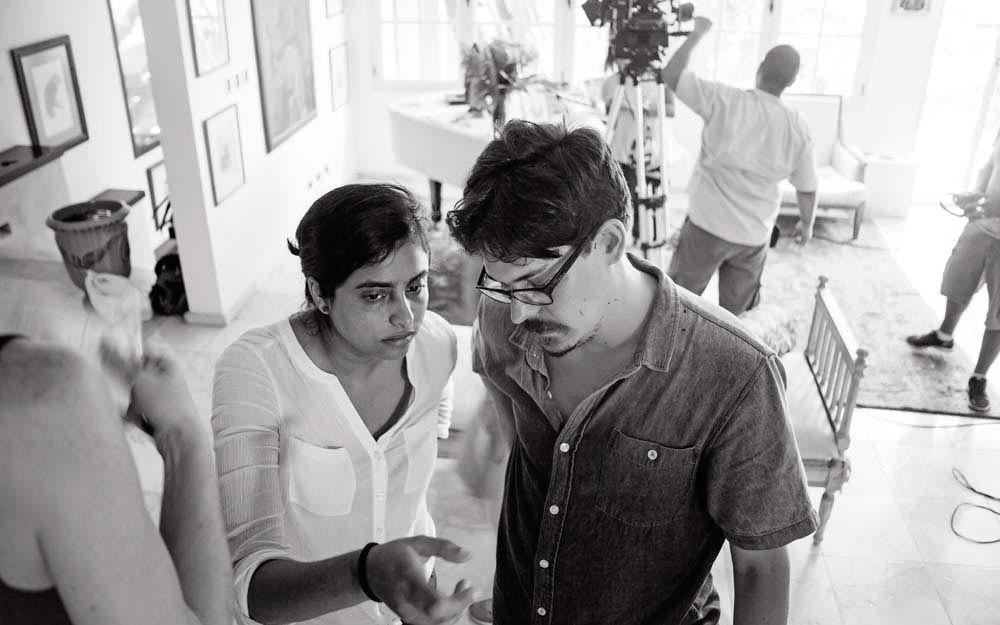“Half of what we are makes us feel ashamed”
Natalia Cabral and Oriol Estrada are filmmakers based in the Dominican Republic — she’s from there, he’s from Spain. Together they’ve made two acclaimed documentaries. Now comes Miriam Lies, their first fiction feature.
Miriam (Dulce Rodríguez) is a mixed-race girl who falls in love online with a boy. When she discovers he’s black, Miriam can’t abide it, and begins spinning falsehoods to him, her family, and best friend. Meanwhile Miriam’s glamorous quinceañera party — the celebration to mark her fifteenth birthday and coming of age — draws closer.
Elevating itself above similar dramas through its unique subject matter and understated tone, Miriam Lies is a moving portrait of youth as well as a subtle critique of a society steeped in unexamined prejudice. Jonathan Ali speaks with the directors about bringing Miriam and her world to life.
This is your first fiction feature, after two documentaries. Why the switch?
Natalia Cabral: Actually, Miriam Lies was our first project. We wrote the script before we made our two previous documentaries, but it took us eight years to gather all the money, so while we were searching for funds we started filming other projects.
What was the inspiration?
NC: When I was a teenager, I met this boy online. We fell in love, but when we agreed to meet and I realised from a distance that he was black, I ran away and never saw him again. This reaction was a surprise, because until then I thought I was the open-minded one in my group of friends and my family. But as years went by, I realised that I could be like them, or worse. I understood that if I wanted to talk about the problems that concern us as a society, the best way was to start talking about myself.
Oriol Estrada: Natalia shared this anecdote with me, and I identified a possible film, so I encouraged her to write based on that anecdote. She started writing from her memories and I was shaping the story. Reality became fiction with a world of its own.
How did you cast Dulce Rodríguez, who plays Miriam?
OE: We saw over five hundred girls. Dulce was one of the first girls we saw. She didn’t have any acting experience, but she caught our eye because she seemed so much like Miriam — intelligent, sensitive, and somewhat rebellious. In that first interview, she spoke about the contradictions of her own life, and understood better than us what could go through Miriam’s head. She always told us: “I am Miriam; this script is my life.”
The Latin American tradition of the quinceañera is central to the film’s plot. Can you say something about it?
NC: The quinceañera party works as a metaphor for my social class’s behaviour. We try very hard to be something else. What we really are, if we can ever understand it, is something that must be kept hidden. We are not comfortable with our African origins — we prefer our Spanish ancestors and their legacy, so you could say that half of what we are makes us feel ashamed, and we live in denial of it, too.
The DR has seen a film boom in recent years, with the majority of productions broad comedies. How difficult is it to get more thoughtful films, like yours, made and seen?
NC: Nobody wanted to produce the film. Then when directors like us finally get their films done, there is no money left for advertising. The comedy productions have big advertising campaigns, so that is what most people in the DR believe cinema is: a light comedy that costs millions of dollars.
OE: Our previous documentaries were of great interest to critics and other film professionals, but not so much ordinary people. We believe that Miriam Lies is our most emotional film, so we assume that for a less specialised audience, the film will have more interest. At least, that’s what we hope.
Miriam Lies
Directors: Natalia Cabral and Oriol Estrada
Dominican Republic, 2018
90 minutes




















